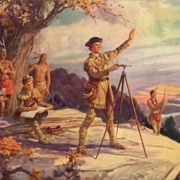Land Surveying: Various Aspects of the World’s Second Oldest Profession
Land Surveying: Various Aspects of the World’s Second Oldest Profession
By Katherine Fry, Writer and Research for Compton Surveying, Inc.
 Land surveying is defined as a method of scientifically and/or legally determining the location of points on the earth’s surface. It also includes establishing the distance between those points and the angles created by them. Often referred to as the world’s second-oldest profession, land surveying integrates elements of engineering, geometry, law, math, and physics. Legally, land surveying determines boundaries. Furthermore, it establishes where property lines begin and where they end. The accuracy of land boundaries depends on a society’s particular regard for the state, county, city, and private property line borders. (1)
Land surveying is defined as a method of scientifically and/or legally determining the location of points on the earth’s surface. It also includes establishing the distance between those points and the angles created by them. Often referred to as the world’s second-oldest profession, land surveying integrates elements of engineering, geometry, law, math, and physics. Legally, land surveying determines boundaries. Furthermore, it establishes where property lines begin and where they end. The accuracy of land boundaries depends on a society’s particular regard for the state, county, city, and private property line borders. (1)
Modern-day land surveyors use Global Positioning Systems (GPS) for accurate point positioning. GPS works through satellites that send signals to receivers kept on surveyors’ tripods. The data is then downloaded into computer software, allowing the surveyor to know the exact position of a point within the time span of a few minutes. (2)
There are several different types of land surveys. These surveys include:
Subdivision surveys: In subdivision surveys, parcels of lands are disassembled into several different units for the construction of new housing complexes. (3)
Site planning surveys: In order to make a site plan and to obtain required building permits, architects, as well as engineers, must create topographic surveys that identify elevation features within exceeding boundaries. (4)
Boundary surveys: A boundary survey determines property lines and defines land corners, as described in property deeds. Boundary surveys must be submitted to governmental offices before construction of any type is commenced. (5)
Topographical surveys: Topographical surveys encompass the identification of both manmade and natural characteristics on the land’s surface. These characteristics include, but are not limited to, buildings, fences, hills, ravines, streams, and trees. Topographic surveys denote the height, location, and size of these characteristics, including gradual changes in land’s elevation. This type of survey is used for design work and the proper division of land for auctions, estates, as well as the building of subdivisions. (6)
Cadastral survey: Cadastral surveys represent searches performed in the registry of public land records. (7)
ALTA surveys: An ALTA survey is a compilation of the various survey subtypes and adheres to the national requirements of the American Land Title Association as well as the National Society of Professional Surveyors. This type of survey is created to specifically satisfy the needs of corporations, lenders and title companies. Additionally, it is exclusively for the building of commercial properties. ALTA surveys contain all required, optional, and possible information that might be requested by entities benefiting from the survey. (8)
 Historical documents claim that the ancient Egyptians, before the construction of the Great Pyramids, performed the first land surveys, as early as 3000 BC. The Greeks later developed the science of geometry and employed it in determining the precise division of land. Early surveyors within the American colonies include Peter Jefferson, Thomas Jefferson’s father, and the first President of the United States, George Washington. Contemporary land surveyors touch almost every aspect of our lives, from our homes to our workplaces, from our roads to our public parks. (9)
Historical documents claim that the ancient Egyptians, before the construction of the Great Pyramids, performed the first land surveys, as early as 3000 BC. The Greeks later developed the science of geometry and employed it in determining the precise division of land. Early surveyors within the American colonies include Peter Jefferson, Thomas Jefferson’s father, and the first President of the United States, George Washington. Contemporary land surveyors touch almost every aspect of our lives, from our homes to our workplaces, from our roads to our public parks. (9)
Modern-day land surveys include various aspects of engineering, geometry, law, mathematics, and physics. The various forms of land surveys, originating in Egypt and still applicable today, continue to impact nearly every corner of our lives. As time goes on, surveyors will remain relevant into the distant future.
If you are in need of a property survey, please contact Compton Surveying, Inc. in Chickamauga, GA at 706-375-3153.
- https://en.wikipedia.org/wiki/Surveying
- https://www.gps.gov/applications/survey/
- https://www.nationwidesurveying.biz/subdivision-surveys
- https://www.pointtopointsurvey.com/service/topographic-surveys/
- https://www.nationwidesurveying.biz/boundary-survey
- http://www.georgialandsurveying.com/residential-surveys/site-plan-redundant-b40/
- http://www.cadastral.com/
- http://www.northstareng.com/what-is-an-alta-survey/
- https://engineering.purdue.edu/~asm215/topics/history.html

